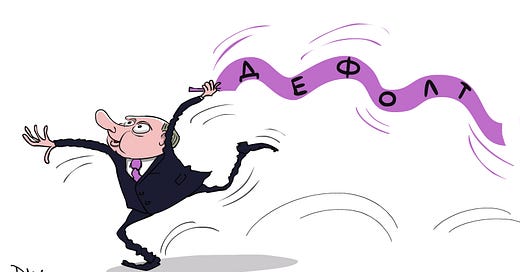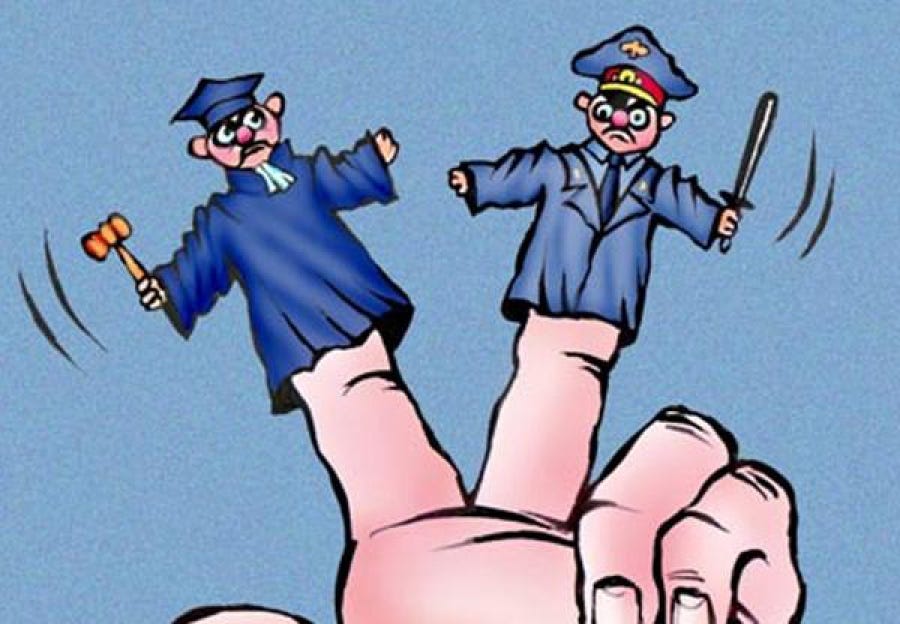June 28, 2022
Another near-default
The time of significant transformations
Kremlin’s hint
Serfdom today
Help is given once
You get your nose out, you get your tail in
Vigilant banker
Quick-firing court
Another near-default
“On June 27, holders of Russia’s sovereign debt did not receive coupon payments on two $100 million Eurobonds by the end of the 30-day grace period, which we view as a default,” rating agency Moody’s reported.
The shortest and most explicit explanation of the implications was a sentence from a White House press release issued BEFORE the agency’s statement: “Russia’s struggling to make bond payments, and Russia’s defaulted on its sovereign debt for the first time in more than a century.” The press release referred to Bloomberg, although under the terms of the bond issue, international rating agencies (Moody’s, Fitch, and S&P), the International Swaps and Derivatives Association (ISDA), bondholders themselves by voting as described in the bond issue documents, or a foreign court if creditors choose to apply there, may default on their external obligations.
In my opinion, the default was hand-made: On May 20, six days before the payment date, the Russian Finance Ministry transferred the necessary funds (about $100 million) to the account of the Euroclear clearing and settlement system, which was supposed to transfer the money to the investors. A license from OFAC, the sanctions arm of the U.S. Treasury, allowed Euroclear to transfer the Russian Ministry of Finance money until May 25. Still, Euroclear did not do so (leaving the money in its accounts).
In theory, bondholders can sue the Ministry of Finance, but I do not think this will change their fate. First, according to the Ministry of Finance’s position, investors didn’t receive payments—not because the debtor didn’t send the payment but because of third parties’ action (or inaction). This circumstance is not stipulated in the issue documentation as an event of default, and it should be considered within the general rules of law governing the terms of the issue, taking into account all the circumstances and the good-faith actions of the parties.
Second, although the bonds are issued under the English law of circulation, the European courts may refuse to entertain such claims because of the reservation made by Russia in its Eurobond prospectuses. The clause states that although the bonds are issued under English law, Russia does not consent to the jurisdiction of any foreign court to hear the claims. Thus, potential disputes would have to be considered in Russia, where the parties would not be guaranteed equality of arms.
Third, even if the court rules in favor of the investors, and Russia, for whatever reason, agrees to enforce it, U.S. banks will not be able to make the appropriate payment because of the sanctions imposed.
The main consequence of the default is that the issuer, even after the settlement of claims, cannot enter the market with new loans for a long time. Russia, in any case, cannot enter the borrowing market because of the sanctions imposed.
All said and done, it makes me argue that the only consequence of what happened will be the acknowledgment of the fact of default itself for history.
The time of significant transformations
Mikhail Piotrovsky, director of the Hermitage Museum, saw fit to speak publicly in support of the Kremlin’s aggressive foreign policy and declared that the war in Ukraine is “the nation’s self-assertion” for Russia.
Now our country has moved into a different time. The first period of the Scythian War is over. We were retreating; we were retreating; now we are not retreating. A turn has been made. And it’s already clear that it’s final. Everything started in 2014 in Crimea. Crimea created a situation where there was no other way; we had to turn around.
Our country is making significant global transformations. And we, accordingly, are in it and with it.
With the attitude towards military action, everything is also not so simple. On the one hand, war is blood and murder. Still, on the other hand, it is the self-affirmation of people, the self-affirmation of the nation... we were all brought up in the imperial tradition, and the empire unites many peoples, unites people, finding some things common and essential to all. It’s very tempting, but it’s one of the, shall we say, good temptations.
Kremlin’s hint
Opposition politician Ilya Yashin was arrested in Moscow and put under arrest for 15 days. He was arrested on Monday night while walking with a journalist he knew.
During the trial, a police report was read out. Policemen claimed that Yashin was detained for a document check, to which he “blatantly refused,” and he also pushed the policemen around and grabbed their uniforms.
The judge refused to interrogate the police officers and watch video from their recorders. When questioned in court, the journalist stated that Yashin did not put up resistance to the police but only asked the reason for the detention. Besides, according to her, the police officers did not introduce themselves nor explain why they checked the documents. As a result, the judge did not consider the journalist’s testimony valid, because she is “on friendly terms with Yashin,” and believed the police officers’ written report without checking their testimony in court.
Ilya Yashin is perhaps the last widely known opposition politician to remain in Russia. In early May, the Moscow police drew up four reports against Yashin under the article on discrediting the armed forces. The court sentenced three of the protocols in late May, and the politician was fined in the total amount of 90,000 rubles. The fourth protocol has not yet been submitted to the court. Russian law stipulates that a repeat violation under the same article can result in imprisonment.
By arresting him today, the Kremlin is sending an open message to Yashin about his future: If you don’t leave Russia, you go to jail.
Serfdom today
The cessation of international flights by Russian airlines resulted in many pilots deciding not to wait for the state’s favors but to take their fate into their own hands and seek work outside Russia. On the surface, the procedure looks very simple: The pilot negotiates with foreign companies, and if they agree, the aviation authorities of that country send a request to Rosaviatsia (Russian aviation agency) for confirmation of the pilot’s data. And here is the barrier: Since April, Rosaviatsia stopped issuing such assurances, preventing pilots from finding new jobs.
There are about 15,000 pilots in Russia. According to Miroslav Boichuk, President of the Russian flight crew trade union, from the end of February to mid-June, foreign aviation authorities from Southeast Asia and Turkey sent about 600 requests. Still, only a hundred people received the necessary documentation.
It is impossible to establish the exact number of Russian pilots who lost their jobs after the war started: Often, airlines state that there were no layoffs, but pilots lose a considerable part of their earnings due to a reduction in the number of flights. In March, the number of passengers dropped by more than 20% compared with last year; in April; almost a third; in May, more than a quarter; and in June, according to preliminary estimates, the situation began to stabilize after the allocation of budget subsidies.
According to Miroslav Boichuk, the average pilot’s income in the industry decreased by 40%. At the same time, the earnings of pilots of long-haul aircraft such as Boeing 777 and Airbus A350/330 have fallen, “in some cases more significantly.” The wages of pilots of medium-haul aircraft operating on domestic flights and SSJ pilots have so far decreased on average by 10%-15% year-on-year in April-May.
Help is given once
Russian hoteliers were among those who received financial support from the government after the war began: In March, hotels were exempted from paying VAT for five years. However, a Russian proverb says, “The appetite comes with the meal.”
No sooner had the ink dried on the government decision than hoteliers decided that the support should be more substantial. Today VAT exemption applies only to pay for accommodation, and additional hotel services—meals, fitness, conference hall rent—are still taxable. The share of different services in the total revenue of hotels can reach 50%.
However, it seems that hoteliers are too late with their ideas. There are requests of “systemically important industries,” which do not include the hotel business, on the tables of the government. There are 21,000 hotels in Russia with 750,000 beds. The main problem of hotels in recent years is the shortage of workers: A large part of workers were migrant workers, the number of which has decreased sharply. As a result, the industry is not threatened by unemployment, which is the most crucial indicator of trouble for the government today. So there is no point in supporting hoteliers.
You get your nose out, you get your tail in
Beef production is the weak point of Russian agriculture, which is quite understandable, given the climatic features of the country. In pursuing the goal of food security—Russia’s self-sufficiency in essential foodstuffs—the Kremlin has imposed quotas and duties on beef imports for over a decade, creating a hothouse environment for Russian companies. The price of imported beef is 25% lower than that of Russian products.
This policy has side effects: If beef production in Russia falls for some reason, it cannot be compensated by increased imports. Changing the quotas is a lengthy bureaucratic procedure that stretches for several months. Such a situation occurred in 2021 when beef prices started overgrowing, and the Ministry of Agriculture allowed importing 200,000 tons of frozen beef to Russia at zero duty instead of the usual 15%. The emergence of a large number of imported products slowed down the growth of prices, but the rapid strengthening of the ruble, which began in April, made imports profitable, even with the payment of duties. Because of this, Russian companies, especially farmers, cannot sell their products at a profit and therefore refuse to sell livestock. As a result, beef production in Russia is declining, making room for imports.
Vigilant banker
Police in the Urals city of Revda (50 km east of Yekaterinburg) accused a resident of spreading fake banknotes with messages about the war in Ukraine. The violation, according to the police, was expressed in the fact that the man wrote anti-war slogans on the bills—“There is no justification for this war”; “War = approval of killing thousands of civilians in Ukraine”; and “Do not watch TV”—and then put them in an ATM.
An employee of the local Sberbank branch noticed the anti-war inscriptions while examining the banknotes and passed the information to the police. Using surveillance cameras, the police, in cooperation with representatives of the Sberbank, figured out who could have put such banknotes in the ATM. Suspicion fell on a resident who is awaiting trial. He faces a fine of 30,000 to 50,000 rubles.
Quick-firing court
11:52 The Tagansky Magistrate Court in Moscow found video service Twitch guilty of an administrative offense of refusing to localize data of Russians in Russia and imposed a fine of 2 million rubles.
12:22 The Tagansky Magistrate Court in Moscow found United Parcel Service (UPS) guilty of the administrative offense of refusing to localize personal data of Russians in Russia and imposed a fine of 1 million rubles.
12:41 The Tagansky Magistrate Court in Moscow found the photo hosting platform Pinterest guilty of refusing to localize the personal data of Russians on the territory of Russia and imposed a fine of 2 million rubles.
13:30 The Tagansky Magistrate Court in Moscow found the company Airbnb guilty of refusing to localize the personal data of Russians on Russia’s territory and imposed a fine of 2 million rubles.





